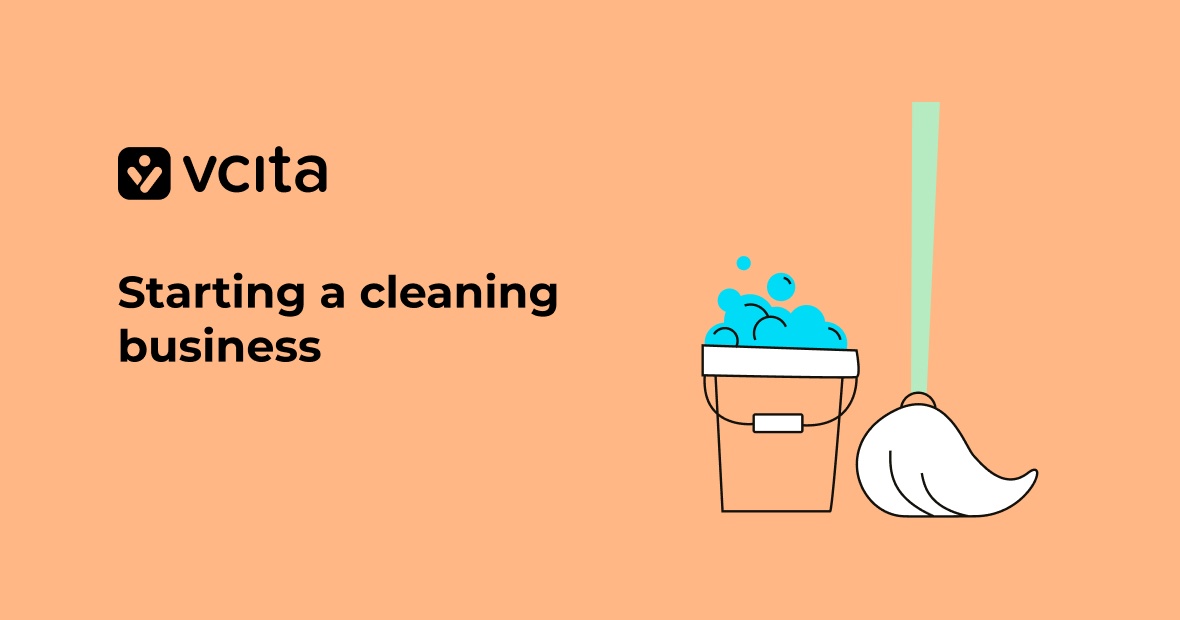Starting a cleaning business can be a rewarding venture. Cleaning services are always in demand, so there’s potential to establish a profitable small business. Before you dive in headfirst, there are a few essential things you need to consider.
Starting any service business requires time, money, and effort. If you’re running your business alone, you’ll be responsible for everything, from marketing and scheduling to accounting and equipment costs. But don’t let that put you off. With the right tools and preparation, launching a successful cleaning business is totally doable and doesn’t need to be stressful.
In this guide, we’ll walk you through what you need to know to get up and running, whether you want to focus on pool cleaning, window cleaning, carpet cleaning, house cleaning, or commercial cleaning services.
Choosing a business structure for your cleaning company
The first and vital step you’ll need to take before you start a cleaning business, or any kind of service business, is to decide what business structure to use. The two most popular options for small service businesses are sole proprietorship and single member LLC. Whichever one you choose, you’ll be able to hire employees, open business bank accounts, and obtain the necessary permits or licenses.
Why open a sole proprietorship for your cleaning business
A sole proprietorship is the simplest structure. You are the business – no separate entity is created. While it’s easy and low-cost to set up, your personal assets are at risk if your business is sued. You won’t get any kind of liability protection for your personal assets.
Why use a single member LLC for your cleaning business
Opening a single member limited liability company, or LLC, is a little more complicated. You’ll need to file articles of organization with your state and pay a fee, so there’s some paperwork involved. But you’ll gain some protection from liability for any business debts or lawsuits that might arise, plus you’ll enjoy some flexibility when it comes to filing taxes.
Obtaining licenses and permits to start a cleaning business
To get your cleaning business up and running, you’ll need to obtain the proper licenses and permits. Whether you’re operating as a sole proprietor or single-member LLC, you’ll typically need a business license or permit to work in your city or county.
Some states require cleaning service businesses to apply for a contracting license, and sometimes you’ll need a DBA (Doing Business As) name registration and vendor’s permit. Read on for more info about each of these permits.
Business license and permit
Most cities and counties require any business owner to apply for a general business license or permit. These typically have a small annual fee. Some states require contractors and service professionals to get additional licensing, depending on your line of business. Check with your local government to determine exactly what’s needed for a cleaning business in your area.
DBA name registration
If you’ll be using a name other than your legal name for your cleaning business, you’ll need to register a DBA, also known as an assumed name or fictitious name. This establishes your business name as an alias for legal and accounting purposes. The registration process varies in each state, but typically requires a small filing fee.
Vendor’s permit
Some states require service-based businesses to get a vendor’s permit, also known as a seller’s permit. This allows you to purchase supplies and materials for your business without paying sales tax at the time of purchase. You might have to pay an annual fee for the permit, and it usually comes with the obligation to charge and remit sales tax on the services you provide.
Creating a business plan for your new cleaning company
A solid business plan is essential for launching a successful cleaning company. Don’t worry, it’s not complicated to write one. It’s essentially an outline of the steps you’ll take to build and operate a successful business. You’ll find it’s a useful guide as you move ahead with setting up your company. Here are the steps you need to take to create a business plan.
-
Write an executive summary
Summarize your cleaning company’s mission and goals in 2-3 compelling paragraphs. In this part, you’ll need to describe your experience; your competitive advantage, like lower costs or more professionalism; and your target customers, like residential, commercial, or post-construction. You also need to include an estimate of your startup and operating costs, and a brief financial projection for the next 3-5 years.
-
Describe your business in detail
List the specific cleaning services you’ll offer, like house cleaning, carpet cleaning, window cleaning or pool cleaning, and describe your operational processes and the equipment and cleaning products you’ll use. In this step, you’ll also share your business location, any office or storage space you’ll need, and what vehicles you’ll use.
-
Analyze the market and your target audience
Next, research and review your local competition and potential customer base. You can do this by estimating the number of residential and/or commercial properties in your area, and the percentage that outsource cleaning. Think about trends in the cleaning industry that present opportunities or threats for your new business. Last but not least, create your ideal customer profiles to detail your target customers. Include their location, income level, and needs, and explain how you’ll reach them through marketing and advertising.
-
Produce financial projections
Every business plan has to cover detailed financial projections, including income statements, balance sheets, cash flow statements, and key metrics for the next 3-5 years. Outline your startup costs, operational expenses, and revenue model, and include conservative and optimistic scenarios based on different sales volumes. Your financial projections should demonstrate how you’ll become profitable and grow your business.
Essential equipment and supplies to get started
To get your cleaning business up and running, you’ll need some essential equipment and supplies. You might be able to get good items at lower prices if you buy them second-hand, but resist the temptation to cut corners. It’s worth investing in quality tools that will ensure high-quality work and happy customers. Here are the basics that every cleaning services company needs.
Vacuum cleaners
A good vacuum cleaner is vital for cleaning carpets, floors, stairs, and upholstery. Look for a model with HEPA filtration and attachments for various surfaces. For commercial cleaning, consider a backpack vacuum or canister vac that allows you to cover large spaces more comfortably.
Mops, buckets, and brooms
A mop, bucket, and washable mop pads are must-haves for cleaning hard floors like tile, wood, and linoleum. Angle brooms, dustpans, and scrub brushes will also come in handy for getting into every corner, and microfiber mops and dusting pads are great for delicate surfaces. Other useful items include cleaning cloths, dusters, trash bags, nitrile gloves, scrub sponges, and cleaning caddies to transport your tools.
Cleaning solutions
Stock up on multi-surface cleaners, disinfectants, floor cleaners, glass cleaners, and any specialty solutions for tasks like oven cleaning or natural stone care. Be sure to follow dilution instructions carefully.
Business management software
Effective business management software is just as vital for success as your broom or mop. An all-in-one solution like vcita includes a CRM to keep your client details organized, marketing tools to promote your business, an online booking system with a booking widget for customers to schedule appointments, and online payment processing so they can easily pay for services. This allows you to focus on cleaning work, not administrative tasks, and increase customer satisfaction.
Managing your cleaning business with an online booking system
As a cleaning business owner, online booking software should be one of your key tools. Using a system like vcita allows you to manage appointments, schedule jobs, and grow your business without missing a beat.
Accept bookings 24/7
It’s a given that your new cleaning business needs a website, so that customers can easily find out about your services and check your pricing. An online booking widget like that offered by vcita embeds into your website so that customers can schedule appointments on their own time. That means no more missed calls for you, and freedom to book cleaning services at will for your customers.
Reduce stress and free up work time
Juggling phone calls and manually managing a schedule can be stressful and time-consuming. Online booking software syncs with your calendar to automate and streamline scheduling to eliminate that headache, freeing you to focus on providing great service and giving you more time for tasks that bring in revenue. It even automatically sends reminders via email and SMS, to reduce no-shows and last-minute cancellations.
Effectively manage demand
It’s not always easy to predict how much demand there will be for your cleaning services from week to week or month to month. An online booking system gives you an overview of your schedule, so you can see demand patterns and make sure you have enough resources to handle the workload. You can also use the software’s availability feature to block off time for vacations, sick days or any periods when you won’t be taking on new jobs.
Grow your business
With an online presence and easy booking, you’ll open your business up to new potential clients. Promote your booking system on your website and social media, so that people looking for cleaning services can easily check your availability and schedule work. The more convenient you make it for customers to book with you, the faster your business can grow.
Starting a new cleaning business can be a tidy path to success
While it may seem daunting to start your own cleaning business, if you go in with a solid plan, the right tools, and an entrepreneurial spirit, you’ll be well on your way to building a thriving company. Before you know it, you’ll be signing cleaning contracts for homes, offices, and everything in between.




























